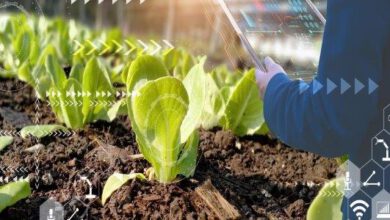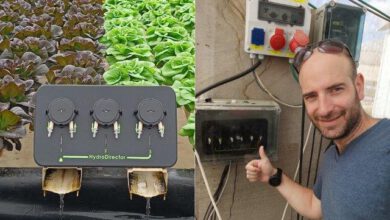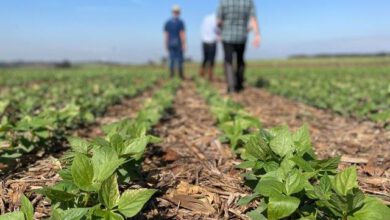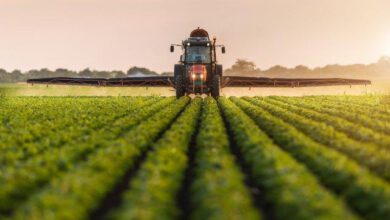"Precision Agriculture is the only way to Sustainable Farming"
How the future of food security depends on precision agriculture
An interview with Naty Barak, Chief Sustainability officer at Netafim

What an honor to talk to Naty Barak! Great insights about the challenges facing our food and agriculture systems and how the future of food security depends on precision agriculture.
As interviewed by Gail Glick, Content Marketing Manager at Netafim:
Q: As the Chief Sustainability Officer of Netafim, what do you think are the current challenges facing agriculture and the global food system? How can we deal with those challenges?
Naty Barak: Precision agriculture is important, in fact, I see it as the only sustainable way forward in agriculture due to the many challenges we face today. According to the latest United Nations report, the world’s population is expected to increase to 9.7 billion in 2050. And to add to this, the urban population will grow tremendously. Probably half of this will be in emerging countries like China, India, and the African subcontinent.
Our resources are limited: water is a critical and limited resource, arable land is a finite resource and energy prices are rising. To this we should add social, political and environmental concerns like poverty and gender equality.
Precision agriculture, and specifically drip irrigation, holistically addresses the point where all these challenges intersect and are essential to meet the needs of this growing population. It is quite clear that the only way to grow more food is to increase the yield while saving the environment from further degradation. It is not just food, it is the four F’s – Food, Feed, Fiber and Fuel.
The only way to get higher yield from limited resources is by changing agriculture into what we call Precision Agriculture, Climate Smart Agriculture, or as I prefer to call it Water-Smart Agriculture”

Q: What do you mean by ” Precision ” or ” water-smart” agriculture? And why is it so important?
Naty Barak: Precision agriculture means giving to the plant exactly what it needs, when it needs it and where it needs it. Applying precise and correct amount of inputs like water, nutrients, crop protection etc. directly to the roots for increasing its productivity and maximizing its yields. Precision agriculture treats the plant, not the soil. Water smart agriculture saves water and eliminates contamination of soils, rivers and aquifers.

Q: How does precision agriculture relate to # Zero hunger by 2030?
Naty Barak: When we started Netafim in 1965, we spoke about the challenges which were facing the world – like growing population, water scarcity, drought and famine. We strongly believed that the innovative technology of drip irrigation could be the answer to these challenges. Drip irrigation was a young and innovative technology, there was no awareness to those challenges, and we had to educate the market to the advantages of our technology.
Things have changed since then. I remember with pride when I participated in the UN General Assembly in 2015 when all the Member Nations adopted the SDGs – Sustainable Development Goals. Many of these goals are related to agriculture and Netafim’s solutions help to achieve many of the SDGs. We are helping to make smallholder agriculture and food systems more sustainable in collaboration with governments, NGOs, financial institutions – all these are geared to achieve not only #ZeroHuger but also end poverty in all its forms everywhere in the world.
Q: What does precision agriculture encompass? Does it only mean precision irrigation, or does it involve other things as well?
Naty Barak: It involves everything to do with agriculture. It refers to everything from irrigation , crop protection models, precise fertigation or nutrition by applying the right mix of nutrients and water, to IoT enabled smart irrigation devices like soil sensors or cloud-based data analytics or satellites that help farmers to know how and when to apply inputs for optimal yields.
Watch how Drip Irrigation is changing the lives of smallholder farmers in India.
Q: If the benefits of precision agriculture are so evident, why has the adoption been so slow?
Naty Barak: Unfortunately, this is a never-ending battle. I think our number one challenge is lack of awareness among the policymakers or decision makers about the immense potential of precision agriculture. But as the pioneers in drip irrigation, Netafim is engaging with stakeholders around the world by sharing its experience and knowledge and we have been successful in this endeavor.
One of our challenges is Flood Irrigation. I often refer to it as “our competitor”.
Flood irrigation is one of the oldest and most-used methods to irrigate crops. Sadly, this is a battle which we haven’t won yet. Flood irrigation causes water source depletion and contamination; it uses an excessive amount of chemicals and has a very negative effect on the planet by releasing large amount of greenhouse gases. Just imagine all those huge rice paddies, wherever it is in the world, or any other flooded fields. They are the major contributors of greenhouse gases in the atmosphere.
We are working hard to change this . In Israel, 75% of irrigation is drip irrigation. More than 40% of irrigation in California is drip. Drip irrigation is adopted more and more in Australia, India, Brazil and Mexico but still globally 70 % of the irrigation is flood irrigation. And this is something that we have to change. We need to realize that flood irrigation can never go hand-in-hand with sustainable agriculture.
Q: So, how do you think that we can overcome this challenge? How can we, make the adoption of drip irrigation faster and on a larger scale?
Naty Barak: I would say that, number one, we need partners. We cannot do it on our own. We need partners in governments, federal or local governments, we need partners in global and local financial institutions, we need to collaborate with civil society. We need collaboration and partnerships with the private sector: users of agriculture products such as food & beverage companies, agricultural input companies and all those people who care. I think the partnerships are essential. Of course, we must do our work. Being pioneers and leaders in precision and smart agriculture, we have the responsibility to lead the shift to precision agriculture.

Q: As pioneers in drip irrigation, how can Netafim help to achieve #Zerohunger?
Naty Barak: As leaders and pioneers in precision agriculture, we are committed to sustainability, in fact – sustainability is our business. We are driven by the SDGs to help create a sustainable world. We’re farmers first and innovators second. We have a mission to help eliminate poverty, end hunger, fight climate change achieve gender equality by empowering women farmers in the emerging world. Bringing economic growth in Sub-Saharan, Africa, India, Latin America. Our foremost and number one partners are the growers or farmers.
Q : What do you think the future of position agriculture looks like?
Naty Barak : I think that data will be the future of precision agriculture. The farms of the future will combine data, cloud-based analytics, IoT enabled smart devices, drones and satellites, and digital farming technologies with farmers controlling everything from their mobile devices.
Business as usual is not an option !
This article was published in the special issue for FWD 2019




